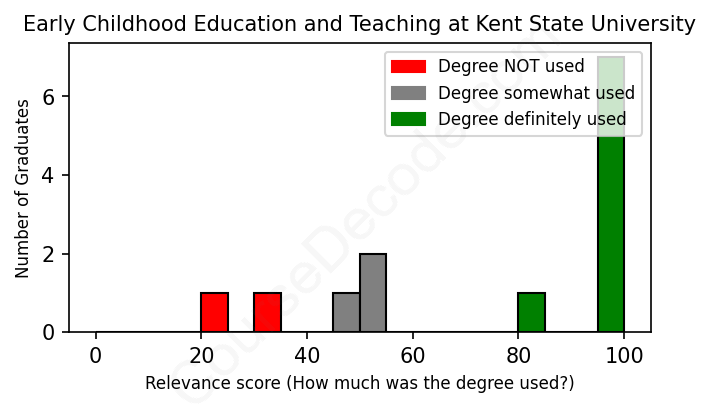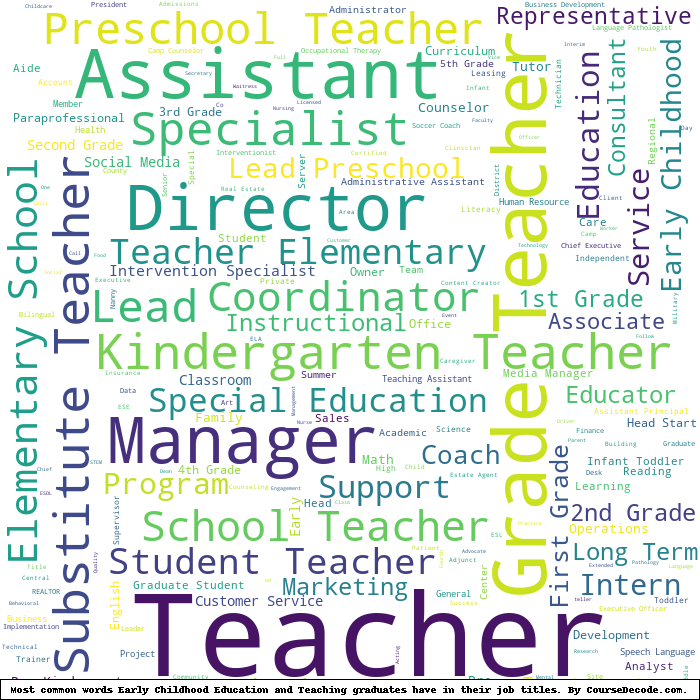
First, some facts. Of the Early Childhood Education and Teaching graduates from Kent State University we've analyzed , here's how many have used (or NOT used) their degree in their career:

These are estimates based on AI analysis of 13 LinkedIn profiles (see below).
The verdict? Above average. Overall, with an average relevance score of 75%, Early Childhood Education and Teaching graduates from Kent State University have a higher likelihood (+8%) of finding work in this field compared to the average graduate across all fields:
And for comparison, here's the chart for all profiles we've looked at across all degrees.
Also, after graduating, only 30% of these graduates have pursued further education other than another Bachelor's degree (such as a Masters degree or other), compared to the average across all profiles of 35%. This suggests a Bachelors degree is enough for most Early Childhood Education and Teaching graduates, and it's normal to look for work straight after graduation.
See the details:
|
Relevance score: 50% We think this person has gone into a career only somewhat relevant to their degree. We think this person has gone into a career only somewhat relevant to their degree.
DEGREE INFOGraduated in 2013 from Kent State University with a Bachelor of Science (B.S.) in Early Childhood Education and Teaching. No other secondary education since. JOB HISTORY SINCE GRADUATIONLead Preschool Teacher The Goddard School Jun 2013 - Jan 2014 Program Case Management Specialist  Clinical Specialties Apr 2014 - Present Early Childhood Educator  Breakthrough Schools Jul 2014 - Present ABOUTI am passoniate about young students reaching their highest potential in their education. Through my college career, I have over 1,500 hours working with children and engaging them in learning activities that allowed them to succeed in classroom. I am looking to obtain a career that will enable me to use my educational background, energetic and positive personality, and my strong organizational skills. During my student teaching experiences while attending Kent State University I was able to tutor below level students in small group settings in reading and writing by increasing the recognition of high frequency words and ability to read grade level books by the end of the school year. With the use of technology and manipulatives, I made learning hands-on and engaging for the students, creating a high participation classroom atmosphere. I also planned lessons to enhance retention of mathematics and literacy, and improve fine and gross motor skills by incorporating music and movement within daily instruction. I created an inclusive classroom community by transforming learning centers into small group workshops, in which children were able to collaborate with their peers through play, reading, building and creating. Through my engaging lesson plans, students were able to learn through discovery and play. |
The top 10 most common jobs done by the graduates we've analyzed (ranked most common to least) are:
After checking out the career paths of graduates from Kent State University with a degree in Early Childhood Education and Teaching, it's clear that many of them have landed roles that are pretty relevant to what they studied. A lot of them became teachers—whether they worked as kindergarten, first grade, or preschool teachers. These positions are a direct match for the skills and knowledge they picked up during their studies, focusing on child development and effective teaching strategies. Substitute teaching also shows up frequently, which still keeps them in the classroom and able to apply their educational training, even if it's temporarily.
On the flip side, there are also some graduates who ventured away from education. Positions like real estate agents and sales roles are pretty far from the day-to-day realities of teaching young kids. While these jobs can involve some skills like communication or customer service that are valuable in any field, they don't really connect to the core of Early Childhood Education. Overall, while many graduates found jobs closely related to their degree and they made good use of their knowledge and skills, there's a noticeable number who took a different path that doesn't fully tap into their education background. So, it seems like while education-related jobs are common, not every grad stayed in that lane post-college.
Here is a visual representation of the most common words in job titles for Early Childhood Education and Teaching graduates (this is across all Early Childhood Education and Teaching graduates we've analyzed, not just those who went to Kent State University):

From analyzing the LinkedIn profiles of graduates from Kent State University with a degree in Early Childhood Education and Teaching, it looks like a lot of them kick off their careers with roles that are directly related to education. A typical first job after graduation seems to be as a substitute teacher or in some sort of teaching assistant role, like tutoring or working at daycare centers. For many, this hands-on experience helps them transition into more permanent teaching positions, which many secure within a few years. For instance, it's common to see graduates moving up to positions like Kindergarten or Preschool teachers relatively quickly after graduation.
Looking about five to ten years down the line, it seems a solid number of graduates remain in educational roles, often stepping into more specialized or leadership positions. Some have transitioned into specific fields within education, like working as Title 1 teachers or even moving into roles such as Speech Language Pathologists. However, it's worth noting that not everyone has stuck strictly to early childhood education—some have ventured into fields like real estate or independent consulting. While there's a mix of paths taken, a good chunk of these graduates seem to find fulfilling careers related to their major, highlighting that a degree in Early Childhood Education from Kent State can indeed lead to meaningful work with children, albeit with some variations in career direction along the way.
Honestly, a Bachelor’s degree in Early Childhood Education and Teaching can be a bit of a mixed bag when it comes to difficulty. At Kent State University, like many places, it usually balances out pretty well—some courses might feel on the easier side, especially if you have a knack for working with kids, while others can really dive deep into child development theories and effective teaching strategies that require more brainpower. You’ll definitely be doing your share of projects, fieldwork, and maybe even some late-night studying for exams, but it’s generally considered more manageable compared to some of the other education or science degrees out there. If you’re passionate about the subject, it can actually be pretty enjoyable!
Most commonly, in the LinkedIn profiles we've looked at, it takes people 4 years to finish a Bachelor degree in Early Childhood Education and Teaching.
So, looking at these grads from Kent State University's Early Childhood Education and Teaching program, it seems like most of them haven’t exactly hit the jackpot money-wise. A lot of them started off as substitute teachers, tutors, or in roles that don’t pay super well, which is pretty common in the education field, especially when you're just starting out. Sure, some have moved into solid full-time teaching positions, and a few have transitioned into more lucrative roles like real estate or specialized roles like speech-language pathology, which can definitely help boost their income. Overall, it looks like they might be doing okay, but none of them are likely rolling in it anytime soon!
Here is a visual representation of the most common words seen in the "about" section of LinkedIn profiles who have a Bachelor degree in Early Childhood Education and Teaching (this is across all Early Childhood Education and Teaching graduates we've analyzed, not just those who went to Kent State University). This may or may not be useful:

Here are all colleges offering a Bachelor degree in Early Childhood Education and Teaching (ordered by the average relevance score of their Early Childhood Education and Teaching graduates, best to worst) where we have analyzed at least 10 of their graduates:
| College | Score | Count |
|---|---|---|
 Kennesaw State University Kennesaw State University
|
86 | 10 |
 The University of Georgia The University of Georgia
|
81 | 12 |
 Miami University Miami University
|
78 | 16 |
 University of Cincinnati University of Cincinnati
|
77 | 10 |
 Kent State University Kent State University
|
75 | 13 |
 Ashford University Ashford University
|
59 | 39 |